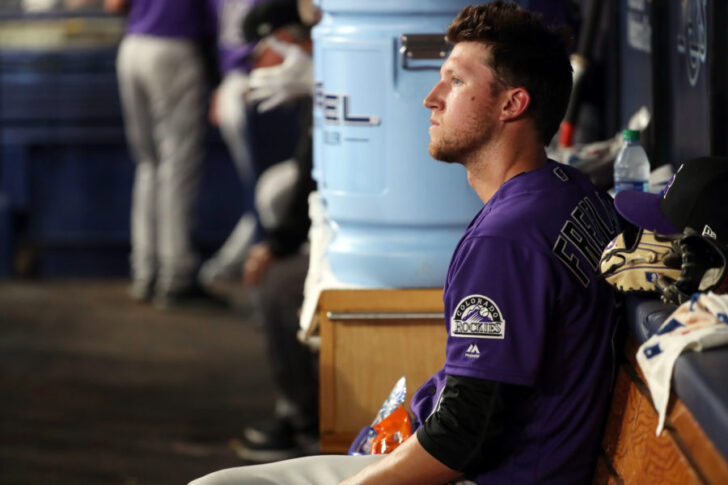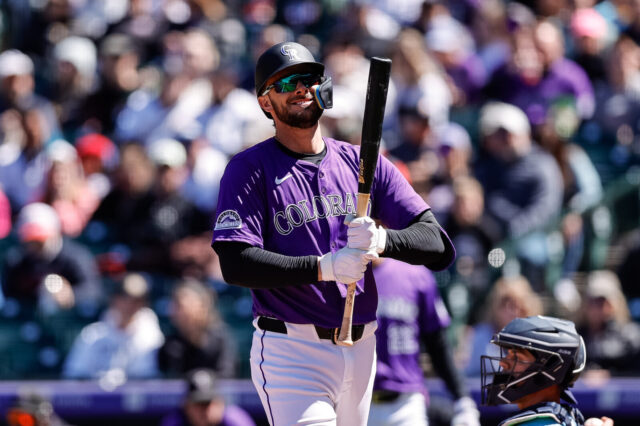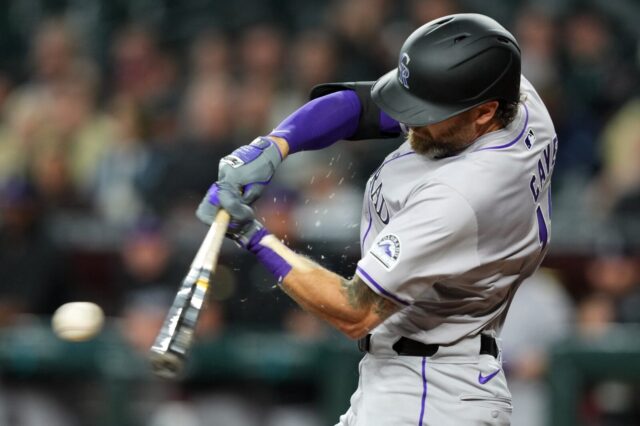Sitting at his locker, head in his hands, the energy for Kyle Freeland was palpable. He’d just given up 10 hits and seven runs to the Orioles, the league’s worst team, and the somber emotions were clear.
Freeland was gone, replaced by a low-confidence copy of the fourth-place Cy Young Award finisher of yesteryear.
With his bravado depleted and his stats inflated, the southpaw made the decision that no major league player envies.
“Obviously, right now, I’m kind of hurting the ball club, not giving them a good chance out there,” Freeland said. “So, I’ve decided to go down and get everything right, get back on track and get back to being me.”
The demotion marks the second time in as many years that the Rockies have sent down their Opening Day starter later in the year. For Freeland, his previous trajectory was one that few Rockies’ pitchers have ever replicated.
In his breakout season, Freeland twirled 202.1 innings across 33 starts and registered the second-best park-adjusted earned run average in franchise history (164). A fastball on the hands of right-handed hitters and a falling away slider against lefties created a pitcher seldom seen at Coors Field.
Everything has changed this year. The fastball has befallen the middle of the plate and the breaking ball has gone flat. Even the changeup has lost its former complexion.
“(The changeup) has to be a lesser velocity pitch than what we’re seeing now,” Manager Bud Black said. “His changeup last year, if you remember, was in the low 80s. This year, it’s in the mid-to-high 80s, so the velocity change and the separation of pitches as far as velocities have to be worked on.”
Among his troubles, opponents have hit .304 off Freeland’s changeup this year. That mark is up from .286 last year, with the average exit velocity off the bats of opponents up 6.8 miles per hour.
The root cause of Freeland’s calamities in his eyes are multiple, his mechanics playing the largest role.
“(I need to work on) my direction down the mound, keeping my arm slot on top, making sure I’m not drifting away from my direct line to the plate, not peeling off too much, not curling in,” Freeland said. “(I’m) trying to get that feeling of having a direct line to home plate and allowing my pitches to work off that.”
The effort to regain his form was hardly an issue for the homegrown hurler. In an attempt to fix his problems, Freeland spent large portions of side pitching sessions working without a ball, his pitching coach on a knee in front of him. They were searching for the tweak that would turn the tide.
At the major league level, finding the fix amidst the pressures of a regular season was too difficult. Going to Triple-A Albuquerque, with the stakes diluted, was a superior course of action.
“When you have trouble finding (a fix), it’s not easy, especially with the pressures of playing at this level where the games mean a lot,” Freeland said. “If you’re going out and don’t have 100 percent confidence in your stuff and things aren’t working for you, it’s hard to make sure that you’re leaving the team in a position to win a ball game.”
His predominant catcher, Chris Iannetta has experienced the pitfalls of major league baseball in a similar fashion. He was twice demoted in his early years, with stints that lasted almost a month both times. It’s no more than a detour for Freeland in the eyes of his backstop.
“Kyle’s gonna be a guy that plays a decade, at least, in this game,” Iannetta said. “He’s going to be a top-tier pitcher. This is just a bump in the road.”
The more direct parallel is Jon Gray. After a nod in the team’s opener last year, he went on to struggle, compiling a 5.77 ERA in his first 17 starts. A trip to Albuquerque came for Gray as well, a stint that lasted two weeks before a return that yielded much-improved results.
When asked for words of wisdom, Gray kept the sentiment purely about mindset.
“(I’d say) don’t let anger fuel you at all. Just understand what the situation is and see it for what it is,” Gray said. “Just go out there, throw the ball and feel like himself again.”
Freeland is self-aware. He’s stated on multiple occasions through the year that though baseball is a hard game, others are not going to feel sorry for him in moments of sorrow. Confidence from his teammates and fans alike is the driving force going forward for retribution.
“I’ve gotten a lot of people reaching out to me,” Freeland said. “Inside the clubhouse, outside the clubhouse, fans tweeting at me, DM’ing me with their support. I’m just looking to use that as a confidence builder, knowing people having my back.”
The road will be rocky for Freeland. His only goal: to receive the ball every fifth day again and lead the team he grew up rooting for.



